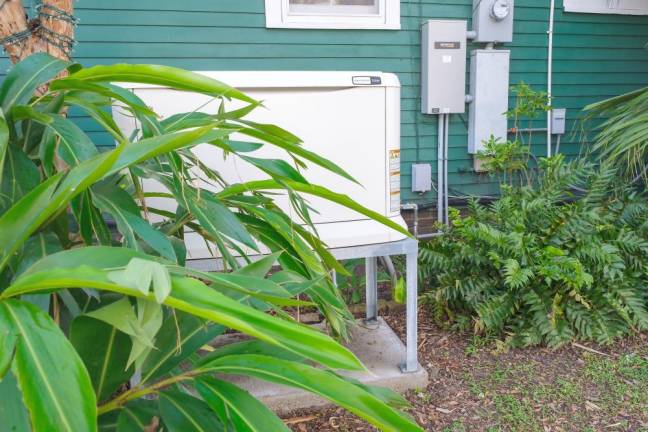Town writes rules for emergency generators
WEST MILFORD. Issues regarding the placement, installation and general use of generators will now be enshrined in the town code.

The Township of West Milford Council recently introduced an ordinance for the purpose of establishing guidelines for siting permanent emergency standby generators, after Mayor Michele Dale and the council determined setback requirements for the siting of these generators is presently unclear in the existing township code.
There will be a public hearing at 6:30 p.m. August 17, when the council again meets in the municipal building meeting room. After the public has the opportunity to ask and get answers to any questions they have about the proposal, the council is expected to vote on a motion to approve the changes.
Officials see passage of the ordinance as a way to clarify the ordinance provisions for emergency standby generators on residential and commercial lots. The mayor and council determined that clarifying the ordinance would be beneficial to the general welfare of the community, particularly in protecting the public during emergency power outages.
Passage of the ordinance will add rules for the town code for emergency standby generators (Code 500-92.1). The purpose of the section is to establish guidelines for siting permanent emergency standby generators to ensure their safe operation and prevent a nuisance to neighboring properties. This section applies to residential uses.
What is a generator?
An emergency standby generator is a fuel-powered generator that is permanently connected to the electrical system of a structure and primarily operates in the event of a power outage to provide backup power. In the event of a power outage emergency, standby generators automatically turn on, or are switched on by the owner and supply power. Once power is restored, the generator automatically transfers the electrical load back to the utilities, or is manually switched off and power is turned back to the utilities. Emergency standby generators are also operated occasionally for maintenance purposes.
A portable generator is not permanently connected to a building’s electrical system, uses a self-contained fuel source and is portable for storage. Portable generators shall be outside when they are being utilized in the event of a power outage emergency or occasionally for maintenance purposes and are not required to obtain approval.
Emergency standby generators shall be considered minor accessory structures (if less than 25 KW in power) and must adhere to the requirements for minor accessory structures as set in local zoning laws. If the generator is larger than 25 KW, standard accessory structure standards apply.
What are the rules?
Generator placement must adhere to manufacturer guidelines. All applicants for an emergency standby generator must submit a Zoning Permit Application. The application must include a site drawing on a raised-seal survey showing the proposed location of the standby generator and associated setbacks to all adjacent property lines. Noise in decibels based on distance from the unit must also be provided.
Residential and nonresidential applicants for an emergency standby generator with a maximum energy output of more than 25 KW shall apply for a minor site plan with the West Milford Planning Board, unless the generator is proposed in conjunction with a major site plan application.
There can be unlimited time for use during an emergency. Exercise of the generator is permitted for maintenance, but not more than once a week, on weekdays, between the hours of 10 a.m. and 5 p.m. and not to exceed 30 minutes of time., whichever is most stringent.
Screening of the unit is required, if visible from any right of way or adjacent properties. Natural screening is preferred wherever possible. If, due to the characteristics of the given lot, natural screening is not possible, fences conforming to the zoning law are permitted.
A generator’s operating sound output cannot exceed the New Jersey Noise Control Act, as measured from the closest property line. Sound attenuation enclosures, screening, and landscaping may be used to minimize noise for neighbors, and bring noise output into compliance with the standards of the New Jersey Noise Control Act.
If a generator is utilizing diesel fuel, the fuel storage tank must be double walled. Emergency standby generators must be installed and operated in accordance with manufacturer’s requirements as well as all local and state codes, whichever is most stringent.
Every application for the installation of a permanent standby generator will require a fee of $40, which shall be separate from, and in addition to, any other zoning permit fees. Any person, firm, corporation or entity that violates any provision of the new code, could be subject to a fine not exceeding $500 for each day the violation continues.

